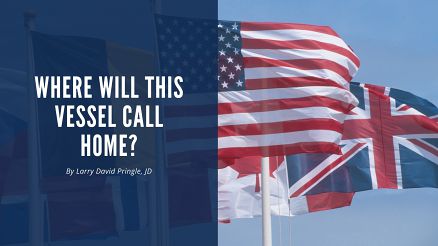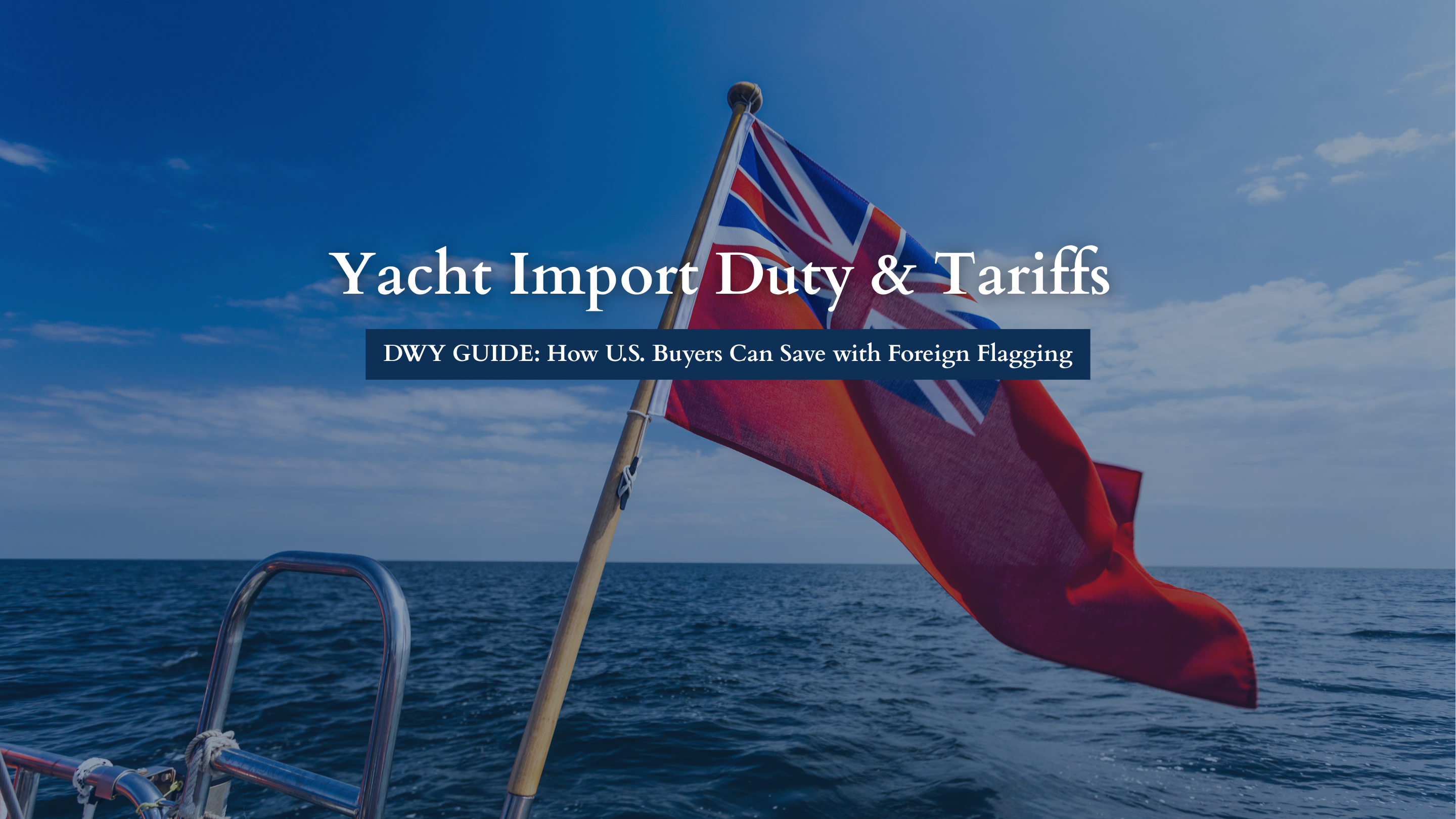Where Will This Vessel Call Home?
WHERE WILL THIS VESSEL CALL HOME?
Every person who owns a boat, yacht, or ship must, upon taking ownership, decide how he or she will answer this question of ‘where will the vessel call home?’.
Maritime lawyers refer to this as choosing the vessel’s flag or country of registration.
Frequently and depending upon the jurisdiction, there may also be subdivisions such as states or provinces within a given flag country, which have registration or licensing rules of their own that can overlap or add to those of the country within which it is located.
The idea of a vessel home flag is driven by a concept in maritime law known as in rem.
A vessel is considered, under most legal regimes, as an entity or thing apart from its owner-- based on historical views of it being a construct unto itself and able to move, operate, and do business around the world’s oceans independently.
It is therefore allowed to claim it’s country or place of ‘home’ independently from the location, citizenship, or residence of its owner or controlling owners.
Owners of both large and small recreational vessels such as rowboats, small outboards or sailing boats, power yachts, and large recreation vessels of all kinds come to discover that their vessel (with few exceptions) is required in most developed jurisdictions under applicable law to have some form of registration and will incur licensing costs.
Such laws are common in the US, Canada, UK, EU, and in many other countries around the world, particularly in the advanced trading nations, and their subdivisions, who view registration/ licensing regimes as necessary to aid in the regulation of Waterway/seagoing traffic and commerce, safe operation of ships at sea and to provide for a healthy/ safe environment for mariners and for the world’s oceans.
It is also, of course, a process which allows these jurisdictions to exercise their powers of taxation, by imposing fees and tariffs as part of these registration processes.
Making sense of this morass of rules and regulations at the state, national, and international levels, and keeping abreast of continual change is not a small task.
Let me start by saying that in light of its complexity, I will deal here only with some of the more important considerations in a very general fashion. Owners are encouraged to seek suitable advice from experienced yacht brokers, yacht managers, and maritime law attorneys for the most accurate, up to date advice.
Small Recreational Boat Owners
Fortunately for most owners in this category, the answer is relatively simple.
The owner of a small sail or power vessel, kept at or near the owner’s residence, in the US or Canada, used locally, and seldom, if ever, moved outside his state and country, is probably best advised to submit to the state/ provincial registration process in which he lives and pay (perhaps rather reluctantly) the sales taxes, registration, and ongoing use fees required by his state/ provincial law.
This is because it is simple, relatively inexpensive, has few legal obligations, and for vessels not going to foreign places, is really all that is needed.
For these kinds of situations, a question then arises as to whether or not the vessel should be also, be registered federally in the US under US Coast Guard rules, and in Canada, under the Canada Shipping Act.
Since both the US and CDA have minimum size requirements for this process, not all vessels can federally document even if they wished to.
Federal registration does however involve some cost, although it is relatively modest in both the US and Canada.
Some Canadian/US lenders and insurers do in fact require federal registration of vessels they cover and some require it in the actual jurisdiction of the lender.
Many owners who reside in the US and Canada choose to register federally with their home Country. This provides a readily recognizable country flag or registration which simplifies customs and immigration procedures when entering foreign countries. It formally authorizes the vessel to fly the flag of that home country while sending the message that it is validly registered and governed by the laws of that jurisdiction. It is also entitled to whatever benefits or handicaps that accrue therefrom.
However, the registration or documentation regimes of these countries are considered by many experts and owners alike to be ill-suited to a larger yacht which will routinely travel to and from foreign nations.
The reason for this is that as mentioned above, a vessel which chooses a US or CDN flag subjects the vessel to all of the laws applicable to ships registered in that country and indirectly through the vessels, to its owners.
Many owners consider the burden thereof to be oppressive, given the heavily regulated natures of these countries and because yachts as a category are required to comply with laws of general application to shipping. It is argued that there exists insufficient recognition that yachts as a class should be considered distinct from true commercial vessels, given their ownership, use, and different manning requirements.
Not recognizing this distinction, it is argued, tends to unnecessarily inflate the cost of yacht ownership.
There is a compelling argument that this differentiation, which actually has been recognized by the UK, resulting in that country developing a yacht registration regime and regulatory format for yachts that are leading-edge, results in a better, more effective yacht construction and operational framework. The result of all of this is that owners in the US and Canada, particularly of larger yachts are increasingly looking for a flag state that recognizes some of these arguments.
The cost of thoroughly investigating possibilities for registering a vessel outside the United States or Canada, sometimes creating legal structures that are required to accommodate them and actually maintaining this foreign registration ongoing, mounts rather quickly, sometimes surpassing any financial benefit to be gained therefrom.
However let us assume that an owner in the US or CDA has a substantial yacht and wants to look at options, understand his local state /province requirements, and evaluate the pros and cons of his or her country's federal documentation process and the benefits of a foreign flag.
State/Provincial Registration
The state/ provincial registration process is a relatively simple process involving usually sales taxes, registration fees, and ongoing usage taxes. These vary in amount, detail, and applicability. Registration numbers or labels are frequently required to be displayed aiding in enforcement.
As indicated, many states/provinces frankly use these laws primarily to assist in funding state coffers. It is not infrequent to see some statutes at this level actually attempt a blatant revenue grab, that may, in fact, in some cases exceed their constitutional authority. These laws need to be read carefully and critically when interpreting them if costs are of concern.
If an owner of a larger more costly recreational vessel frequently uses the vessel out of state perhaps has a vacation home in another state, or frequently moves the vessel between several states, or neighboring countries, understanding the applicable laws of all jurisdictions can be beneficial.
Know the exemptions in those laws, the limits in law upon all jurisdictions’ attempts to tax both residents and non-residents when using either federal or state waterways. Understand alternate ownership structures and pursue opportunities to minimize the tax, fee, and licensing burdens of ownership.
Country Flags
As the size and value of the vessel increase, its area of operation expands, the cost of operating, crewing, and maintenance accelerates, the financial and operational benefits offered by other Flags can become increasingly attractive, and the choice of flag can have important consequences.
As all jurisdictions around the world struggle for more revenue, deal with increasing pressure to regulate “bad” behavior, and desire to provide more protection for citizens, laws constantly change and become increasingly stringent.
Such considerations as intended usage, purchase price taxes, ongoing registration/use taxes, crew regulatory laws, vessel classification, safety/ inspection/verification requirements, income or revenue taxes upon charter operations, categorization of expenses if applicable, charter regulation, the effect on usage of the vessel in its primary cruising grounds including entitlement to cruising permits, vessel inbound procedures in foreign ports, and of course, financing & insurance coverage/availability, all need to be evaluated when making the choice.
There are a significant number of national jurisdictions which offer yacht registration.
They range across the spectrum.
The developed nations such as US/CDA, UK, France, and many others all have advanced regulatory obligations, detailed tax codes, ongoing fees, laws covering vessel manning/safety regulations, and much more. These may be considered the “ heavily regulated” ones.
On the other hand, some jurisdictions offer a vessel registration regime that (and here I only slightly exaggerate) simply ask the name of the vessel, charge you an initial and ongoing registration fee, and send you their flag, full stop.
There are also many in between these two extremes.
Many ask me given that the simple ones seem to have an attractive legal regime (or rather the absence of same) ‘why does not everyone subscribe?’
These countries usually have virtually nothing in terms of laws that apply to inspection/maintenance, crew health and welfare, safety at sea, chartering and protection of charter passengers, and related issues. Therefore... are they not attractive to most owners who must pay the bills?
Any conscientious owner could still voluntarily comply with other more sophisticated ship applicable standards formulated by other regimes, for important subject matters.
The answer lies in the old adage that “not all that is shiny and yellow is gold”
This is because many jurisdictions firmly in the heavily regulated category make it difficult for yachts registered in the simple ones to operate in the more desirable jurisdictions. They do so by enforcing laws related to customs/immigration, safety, smuggling, cruising permits/charter authorizations, and related subjects, and thereby try hard to support the level of overall regulation including vessel inspection, tax regimes, and limited access to privacy that they insist upon.
More and more North American owners with larger more expensive vessels are interested in seeking a flag that provides a better combination of both respected registration and reasonable/safe maintenance and operation rules designed specifically for yachts, all in a country which also provides less tax and expense burden, less complication, and more privacy for yacht ownership.
Most owners start the process by an analysis of the following questions, including and ranking their priorities:
- Where the vessel will spend most of its time?
- Will she charter?
- What is the tax treatment of the vessel and its revenue/ expenses?
- What are the financing and insurance requirements?
- What are the vessel manning rules of the potential flag and what issues do these raise?
Some examples of issues that prioritizing can identify:
A number of countries require vessels operating commercially in the jurisdiction to be manned by citizens of that jurisdiction, with licensing credentials issued there.
In short, a UK licensed master, regardless of competence, cannot run a pleasure tour boat between cities in some countries. Since many capable experienced yacht captains and crew are citizens of and credentialed by countries with substantial maritime traditions such as the UK, Australia, CDA, New Zealand, etc., registration in some countries may limit manning choices dramatically for that yacht.
Another example is that many heavy regulated ones require that its flag vessels maintain strict compliance as the vessel ages, with the construction standards set forth under the original build society applicable to her at construction.
Some argue that these rules really are at times overkill because they take rules originally designed for commercial ships and attempt to apply them to private yachts.
This situation can obviously drive the cost of vessel maintenance and operation up sharply, and arguably unnecessarily.
Many owners accept that the correct way through this maze is to choose a flag that can provide a solid yacht/commercial registration generally accepted both in the yachting/shipping industry and by most governments of the world but which achieves a reasonable balance between the extremes of high tax/high regulation on the one hand and those which have little of either, on the other hand.
A great place to start this process is, perhaps surprisingly, in Paris, France.
It was here that a number of countries (primarily the heavily regulated) met some years ago under a document entitled Paris Memorandum of Understanding on Port State Control.
These countries were involved in Atlantic, North America, European, Mediterranean trade/sea traffic and agreed to develop and maintain a “White List” of those countries that have demonstrated, in the opinion of the Paris signers, good laws and compliance within the categories of vessel safety & security, safe operational standards, and adequate crew living & working conditions.
So as not to leave much to the imagination they also developed a “Grey List” and a “Blacklist” which contain names not qualified to be on the “White List”.
As a general statement, every attempt is made, by the heavily regulated countries, to discourage the use of Flags not on the “White List” including boardings, inspections, difficulty obtaining cruising permits, etc.
Included in the “White list” are countries known as the Red Ensign Group.
This is a group of countries, (of which the Cayman Islands, Isle of Mann, and Gibraltar are examples) that are current or former British overseas territories. These nations have a reputation for having high standards in the important categories referred to above and benefit from the use and privileges of the British Consular Service. They have the protection of the Royal Navy and still respect confidentiality, and have reasonably friendly tax regimes that typically avoid the overzealous nature of the intense revenue-generating laws of many highly-industrialized nations. This group all uses and enforces the MCA (UK) Large Yacht Code as approved by the International Maritime Organization (IMO) as criteria for building, equipping, and manning yachts.
These states do a fairly good job of finding a reasonable “compromise” and they are popular with owners who are enjoying the side effect of increased value upon resale due to the need to be in compliance with the Large Yacht Code.
The Red Ensign states are unquestionably popular, but there are some drawbacks, such as the unavailability of temporary, non-taxable importation of vessels into the EU.
Others outside the Red Flag umbrella include such jurisdictions as The Marshall Islands. This location also offers a reasonable possible alternative. The MI has little in the way of laws imposing significant taxes/ fees or that limit the ability of owners who want privacy, but the nation does enforce basic build/scantling maintenance, life-saving, safety, and manning rules on yachts that charter.
Yachts with this flag are accepted by most countries as visiting yachts entitled to cruising permits etc. and are not generally limited in their activities.
Other options exist for Yacht owners who may have different or varied objectives. Some islands in the Caribbean offer very flexible opportunities involving little or no taxes and fees, but offer little in the way of safety, security, inspection, or laws involving maintenance or safe handling and could be considered trending toward the more “simple” side of the equation.
The bottom line: The choice of a flag state for many yachts is a complex consideration and there are many important aspects an owner will need to consider in order to make the most informed decision.
For an in-depth analysis, an owner should consult international yacht registration specialists, maritime lawyers, and tax professionals, who have appropriate knowledge of potential jurisdictions.
Larry David Pringle, JD
Larry is a retired Canadian and US lawyer with extensive experience in maritime matters. He is a yacht broker with the Ft. Lauderdale office of David Walters Yachts. All information in this article is for discussion purposes only and readers are encouraged to seek specific professional assistance tailored to their needs and circumstances.









LEAVE A COMMENT